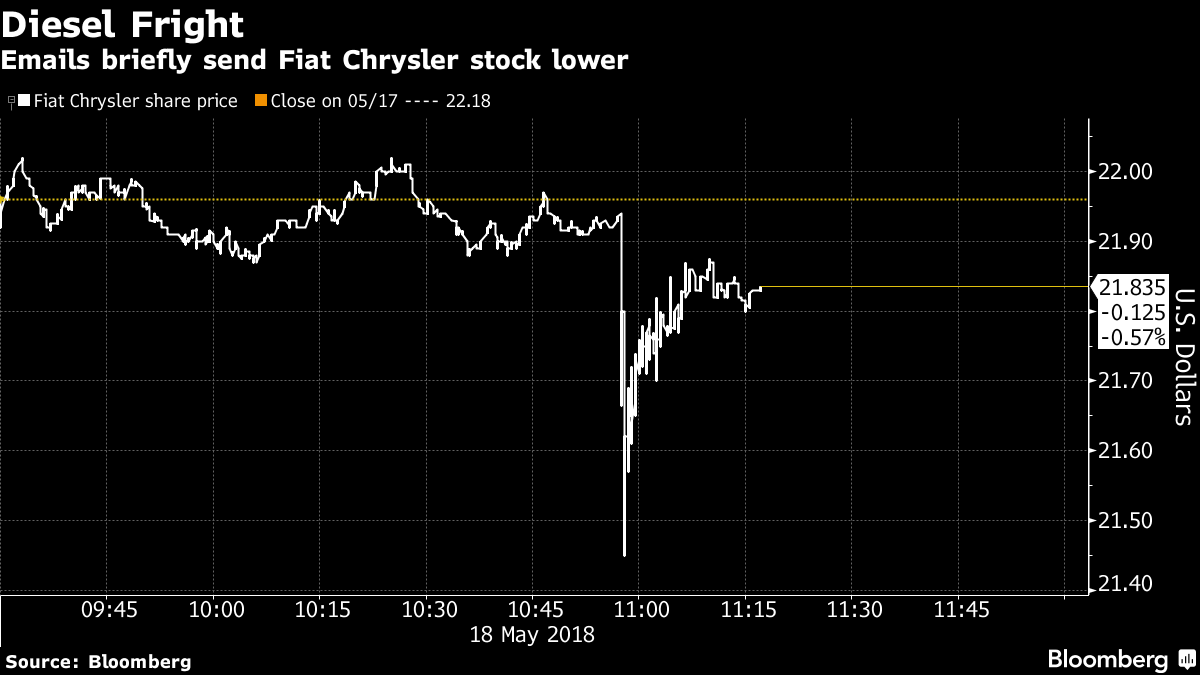Fiat Chrysler Automobiles NV discussed alleged illegal use of software to pass emissions tests in 2010, according to emails disclosed in federal court in San Francisco this week.
Fiat Chrysler wanted to use software in its diesel engines that was capable of “cycle detection,” meaning it could sense when the vehicle was undergoing emissions evaluations and activate controls to pass tests, Sergio Pasini, the controls and calibration director at supplier VM Motori, wrote in a 2010 email to colleagues. An employee within the automaker’s powertrain division had tried to convince him the software, called “t_engine,” didn’t count as cycle detection.
The automaker’s emissions control “will be managed mainly on t_engine which is, no matter what Fiat says, a cycle detection,” Pasini wrote in an email, according to a court document that was unsealed on Wednesday.
Fiat Chrysler’s U.S. shares extended declines Friday, falling as much as 3.3 percent, and were down 2 percent to $21.73 as of 11:01 a.m. in New York.

The lawsuit, filed on behalf of consumers as a class action, claims that Fiat Chrysler misled buyers of its Jeep Grand Cherokee sport utility vehicles and Ram 1500 pickups by touting the fuel economy and performance of its EcoDiesel engines while cheating on emissions tests to win regulatory approval. Fiat Chrysler
has denied intentionally trying to skirt pollution rules with defeat devices in its diesel vehicles.
“We continue to cooperate with various governmental investigations related to diesel emissions, and emails such as those referenced have been previously provided to the agencies,” Fiat Chrysler said in an emailed statement. “It is inappropriate to draw conclusions from isolated communications and internal deliberations, without the more detailed context that is part of the reviews FCA is conducting as part of the investigation process.”
Diesel Scandals
Fiat Chrysler is defending itself against allegations reminiscent of Volkswagen AG’s 2015 admission that it had rigged some 11 million diesel vehicles to pass emissions tests, sending shock waves through the industry. The German carmaker has earmarked more than 25 billion euros ($30 billion) to pay fines, settlements and other costs. The scandal has compromised
demand for diesel cars and put other manufacturers under a cloud of suspicion and regulator scrutiny.
Why Carmaker Cheating Probes Stay in High Gear: QuickTake Q&A
In Fiat Chrysler’s case, the U.S. Environmental Protection Agency and California Air Resources Board alleged in
January 2017 that the company equipped diesel-powered pickups and SUVs with emissions software that violated clean-air laws. The agencies alleged the diesel engines contained auxiliary emissions control devices that affect pollution performance, and that the company failed to disclose this to the agency as required by law.
The Justice Department sued Fiat Chrysler in
May 2017, asserting more serious allegations. The civil lawsuit alleged that 2014 to 2016 model year Jeep Grand Cherokee SUVs and Ram 1500 pickups had diesel engines rigged with defeat devices to mask true pollution levels in lab tests while exceeding legal limits in real-world driving.
Automakers are legally allowed to use emissions-control software to help engines run properly. What made the software that VW used defeat devices were computerized systems that activated pollution controls to pass tests but improperly disabled them during regular driving.
‘Compelling Evidence’
settlement offer presented to Fiat Chrysler by the Justice Department in January cited “compelling evidence” that the company knew or had reason to know that the diesel engines didn’t comply with clean-air laws and had misled regulators to win their approval to sell the vehicles. Justice Department lawyers wrote that multiple Fiat Chrysler vendors and employees had warned that defeat devices were being used in the diesel pickups and SUVs.
In 2012, another VM Motori employee, Emanuele Palma, wrote to colleagues that Fiat Chrysler “knows tEng is the only way to get to 30 mpg, so don’t worry about this topic.” The automaker touted the 30 miles per gallon highway gas mileage in marketing materials for its 2014 Jeep Grand Cherokee.
The lawsuit alleges that another supplier, Robert Bosch GmbH, warned VM Motori that the so-called t_engine software was an emissions defeat device, and that they could face “serious penalties” if it was discovered by regulators. Bosch, the biggest supplier of diesel-engine technology to global automakers, remains under
investigation over its role in the VW scandal. VM Motori responded that it was “working closely with Chrysler” and the feedback about the software “is positive.”
Fiat Chrysler bought a 50 percent stake in VM Motori in 2011, and purchased the remaining shares from General Motors Co. in 2013.
The complaint with sealed material was filed April 23, then re-filed Wednesday with redacted portions that were newly visible.
The lawsuit filed in federal court in San Francisco is a proposed nationwide consumer class action to cover owners or lessees of more than 100,000 EcoDiesel Ram 1500s and Jeep Grand Cherokees that were equipped with a technology called “selective catalytic reduction,’’ or SCR, to reduce nitrogen oxide emissions.
Separate Suit
In a separate lawsuit brought by shareholders in 2015 claiming the company misled investors about vehicle safety problems, an unsealed document filed in federal court in Manhattan on Monday alleged that
several employees knew the company’s diesel vehicles contained defeat devices before regulators made their concerns public.
The document alleged that a Fiat Chrysler employee claimed to have alerted upper management that diesel engines contained such devices and indicated that a description of an emissions control strategy the company provided to regulators was inaccurate in internal messaging communications in 2014.
Fiat Chrysler said it has begun settlement mediation with “several governmental and private parties that have commenced civil litigation” against the company, according to its statement. The automaker said it’ll “defend vigorously against any claims that FCA US engaged in any deliberate scheme to install defeat devices or to cheat emissions tests.”
The case is In Re: Chrysler-Dodge-Jeep Marketing, Sales Practices and Product Liability Litigation, 17-md-02777, U.S. District Court, Northern District of California (San Francisco).
— With assistance by Tommaso Ebhardt
